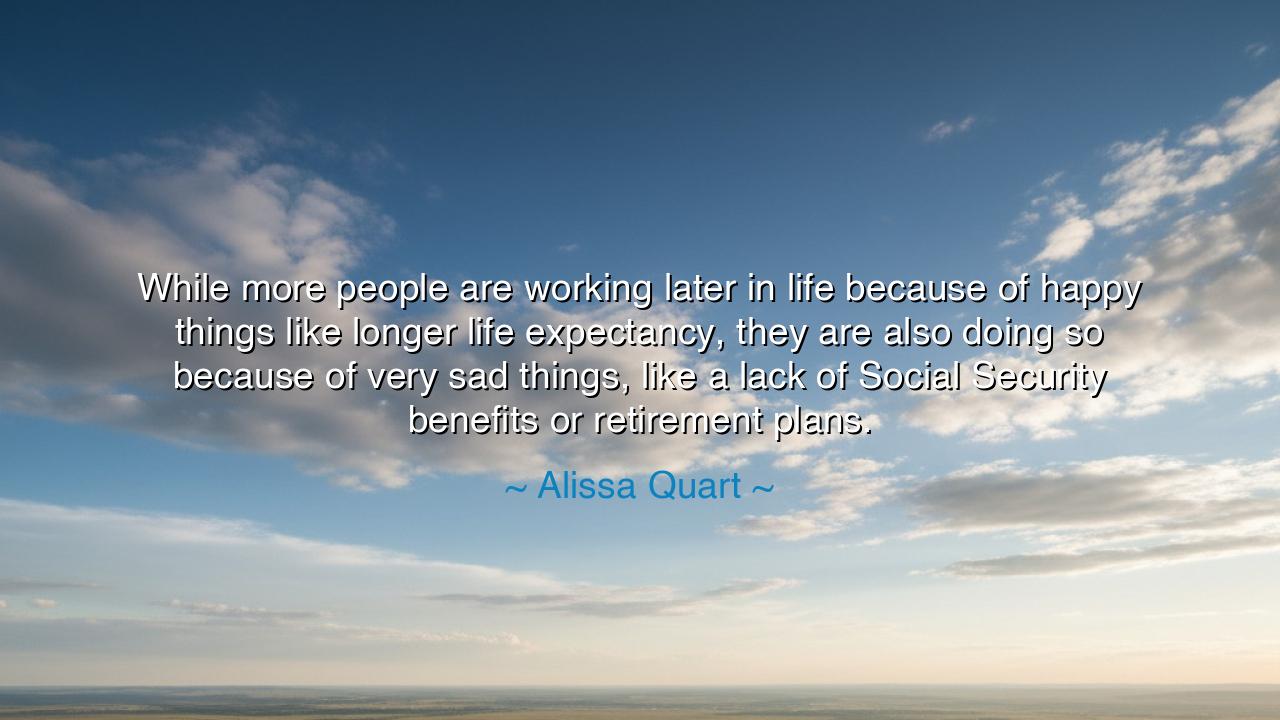
While more people are working later in life because of happy
While more people are working later in life because of happy things like longer life expectancy, they are also doing so because of very sad things, like a lack of Social Security benefits or retirement plans.






Hear, O children of toil and wisdom, the words of Alissa Quart, who gazed upon the struggles of our age and gave voice to a truth both bitter and tender: “While more people are working later in life because of happy things like longer life expectancy, they are also doing so because of very sad things, like a lack of Social Security benefits or retirement plans.” This saying is no idle reflection, but a mirror held up to the modern condition, where longevity and hardship walk hand in hand, and where the blessing of more years is often shadowed by the burden of insecurity.
The meaning is double-edged. On the one side, it is a triumph of humanity that men and women live longer than their ancestors, nourished by medicine, knowledge, and care. Longer life expectancy is a gift that ought to bring joy, for it grants time to love, to create, to learn, to watch generations rise. Yet on the other side lies the sorrow of necessity: that many who should be resting in the autumn of their lives must labor still, not because they wish to remain active, but because the world has left them with no safety, no wealth stored, no plan for shelter. What should be a season of reflection becomes instead another season of toil.
History bears witness to this tension. In ancient Rome, the elder statesmen, the senatores, often remained in the affairs of state well into their age, but they did so because their wisdom was honored, and their needs were provided for by their rank. Contrast this with the peasantry, who, without lands or wealth, often worked until their final days, not from dignity but from desperation. So too in our modern world, we see both faces of this reality: the elder who chooses to labor for joy, and the elder who labors because he cannot afford not to.
Consider also the story of America’s Great Depression in the 1930s, when countless elders, having worked their whole lives, found themselves destitute with no means of rest. It was out of that darkness that Social Security was born, a covenant meant to shield the aged from poverty. And yet, as Quart’s words remind us, that covenant has weakened; many elders once again find themselves working not from choice but necessity, serving as greeters, clerks, or laborers when their bodies cry out for peace. This is the sorrowful side of her words—the vision of dignity threatened by neglect.
Yet the teaching is not all despair. There is also the recognition that longer life can be filled with productivity, joy, and purpose if society honors its elders rightly. Many who work in later years do so because their spirit is still burning, because they find fulfillment in creation, teaching, and service. This is the noble face of Quart’s observation: that age does not strip away vitality, and that work, when freely chosen, can be a blessing that keeps the heart strong and the mind alive.
The lesson for us is twofold. First, as individuals, we must prepare wisely for our later years, saving where we can, building communities of support, and living with foresight rather than indulgence. Second, as a society, we must guard the dignity of the aged, ensuring that work in later life is a choice, not a punishment. To abandon the old to toil without rest is to betray the cycle of life, for the young too will one day grow old, and they shall reap what they have sown for their elders.
As for practical action, let each person cultivate both prudence and compassion. Plan for the future with discipline, so that your own later years may be lived in dignity. And look also to the elders around you—support them, advocate for systems that protect them, and honor the work they have already done. If you are young, remember that to serve the old is to serve your own future self. If you are older, seek ways to continue living with purpose, but never let society rob you of the right to rest.
Thus, Quart’s words remain as a torch of truth: longer life is a gift, but without justice, it becomes a burden. Let us therefore labor not only for ourselves but for one another, so that the blessing of years may truly be lived in peace, and not in sorrow. In this way, future generations may look back upon us and say: They honored their elders, and in doing so, they honored life itself.






AAdministratorAdministrator
Welcome, honored guests. Please leave a comment, we will respond soon